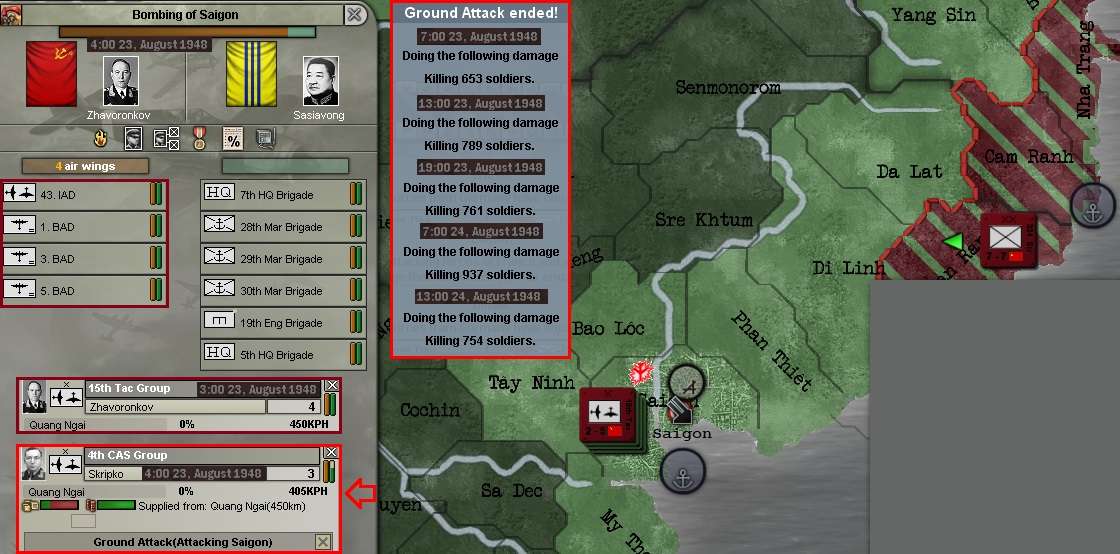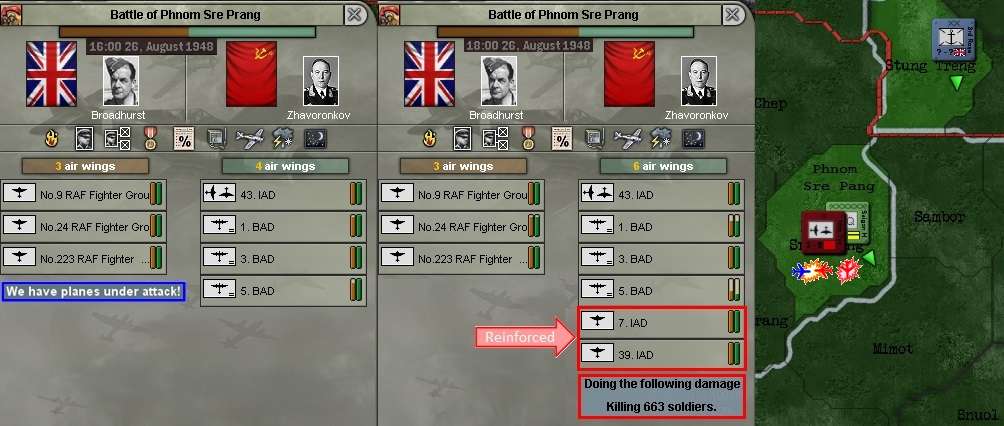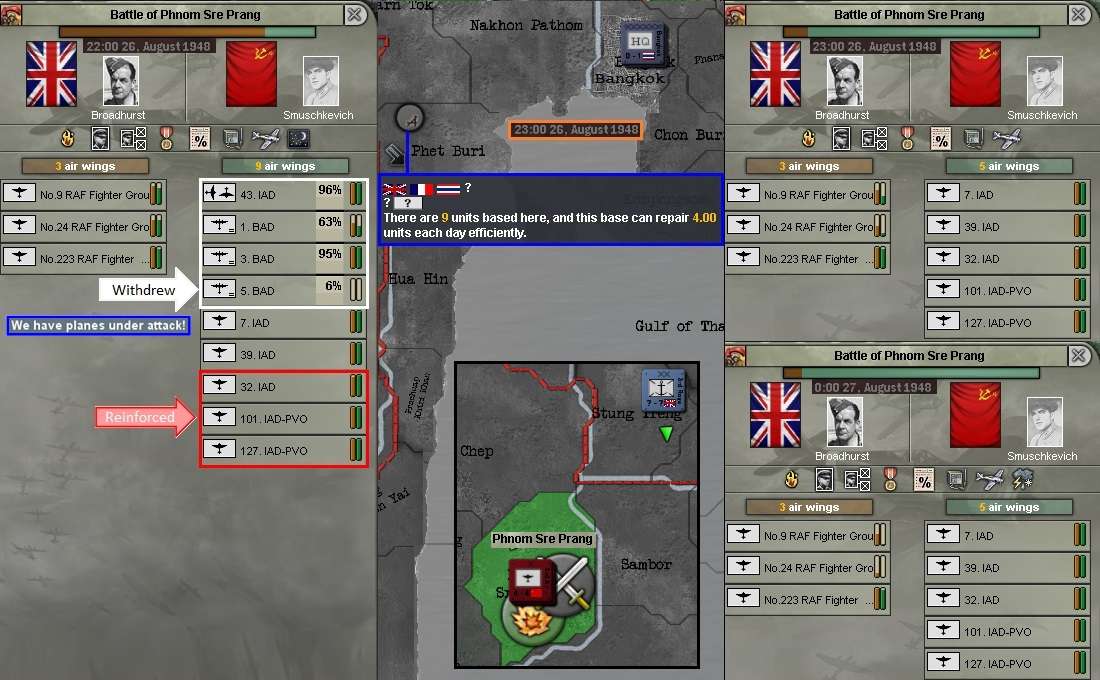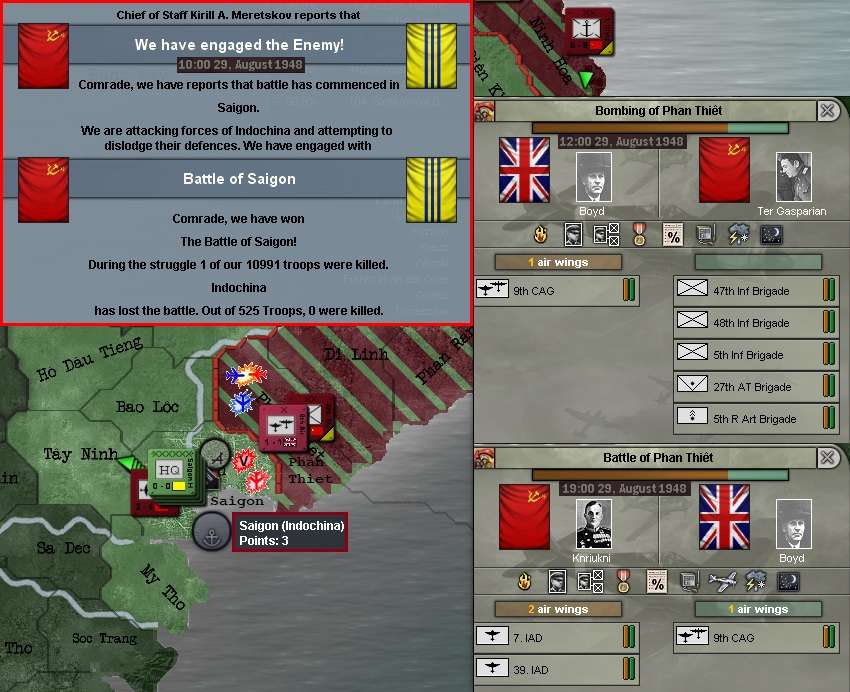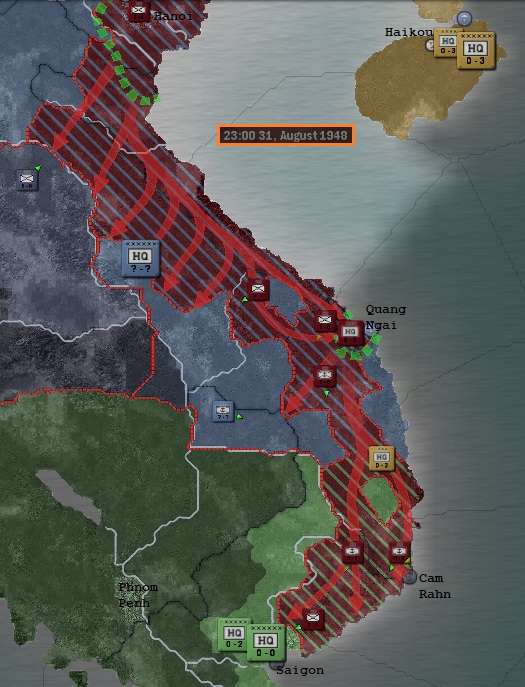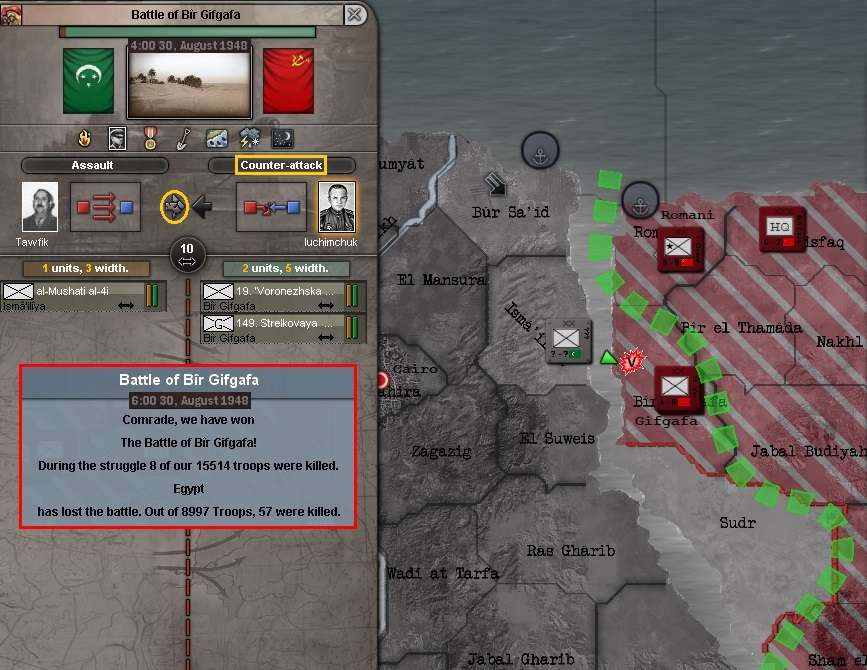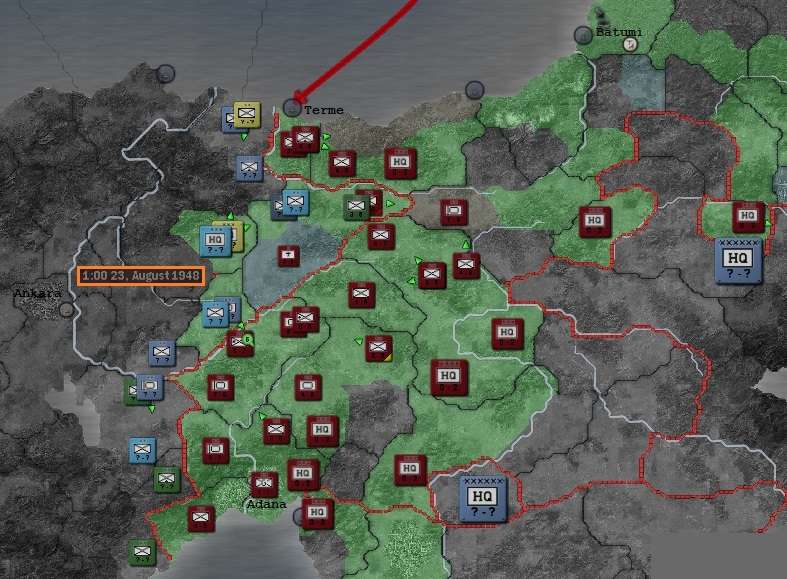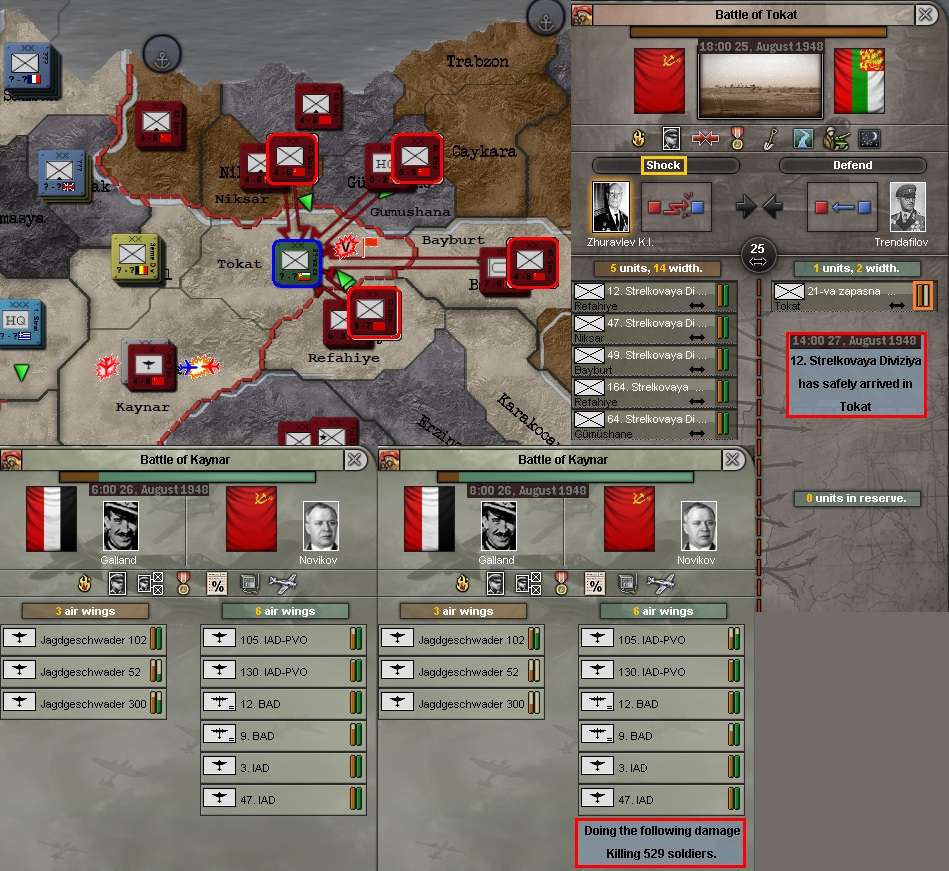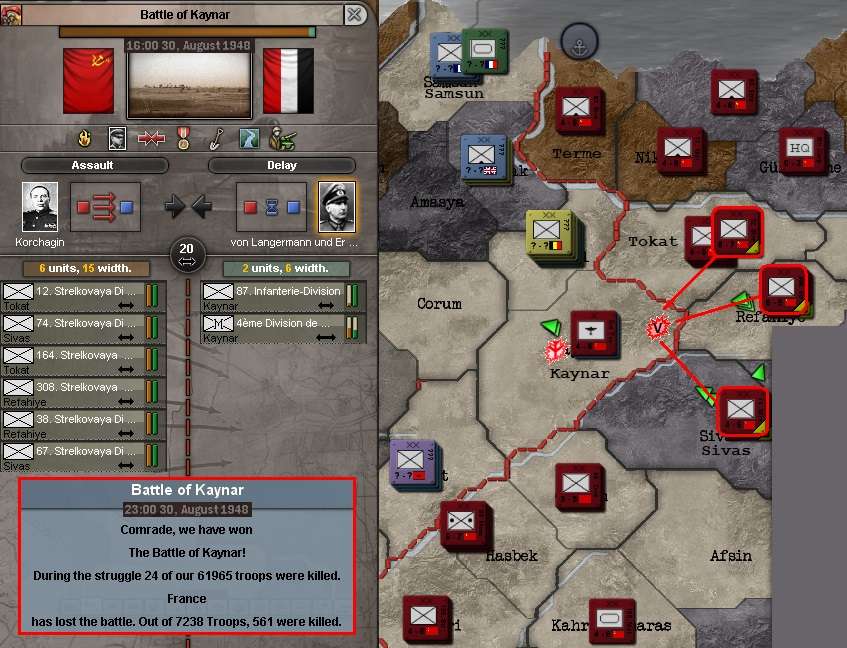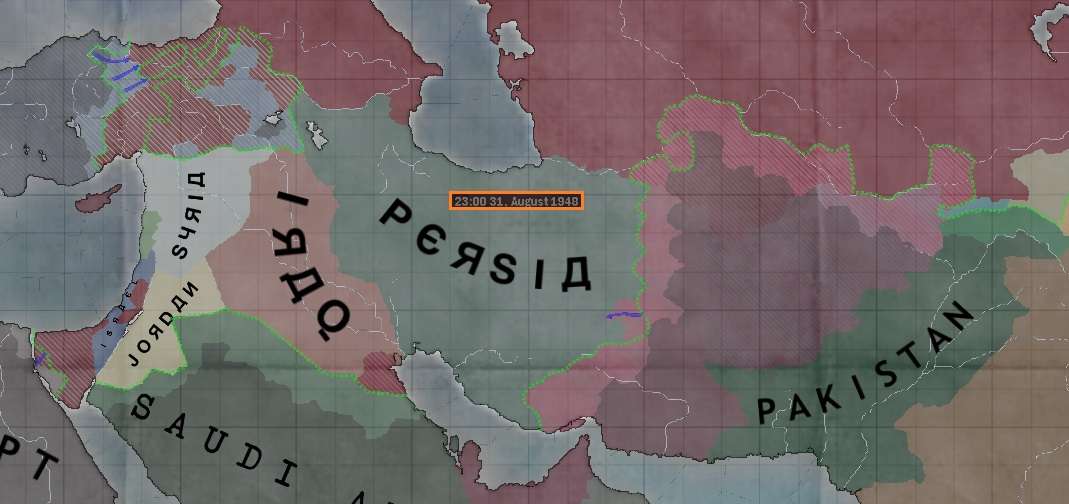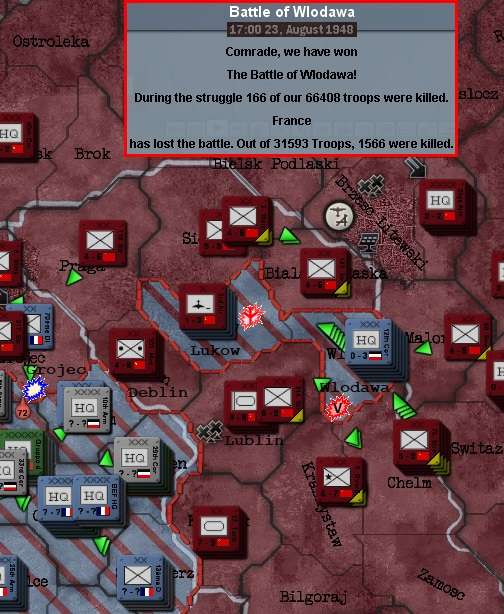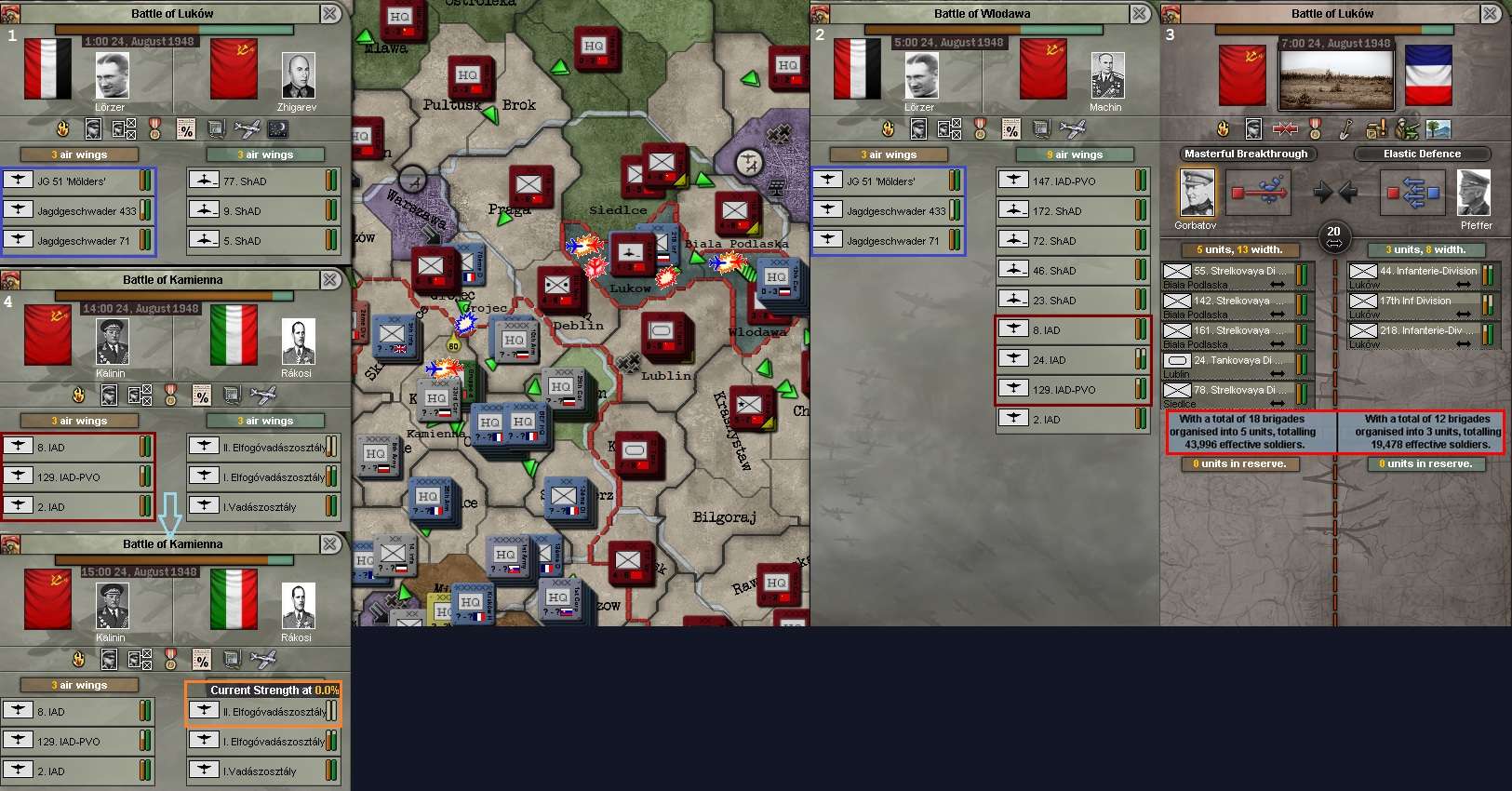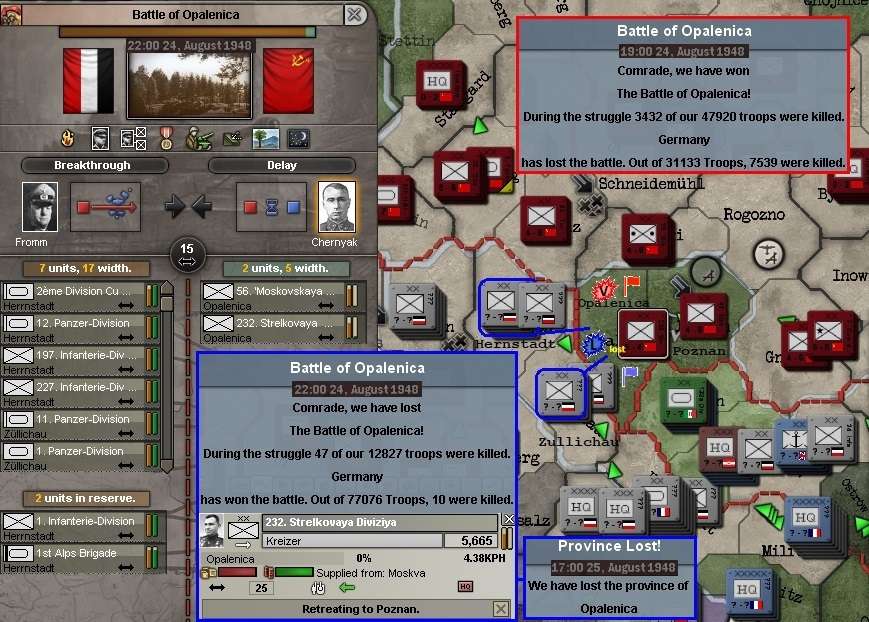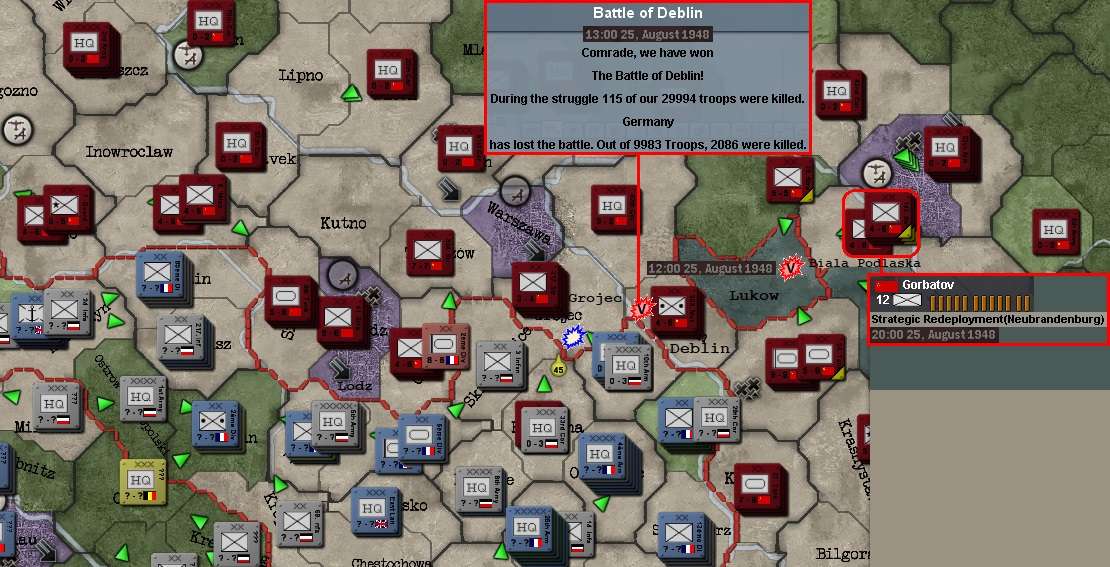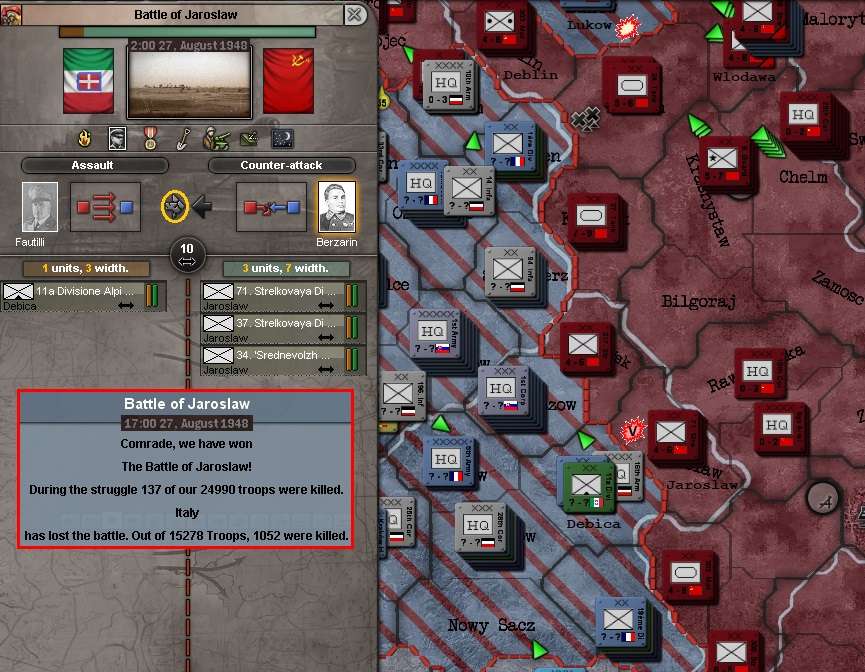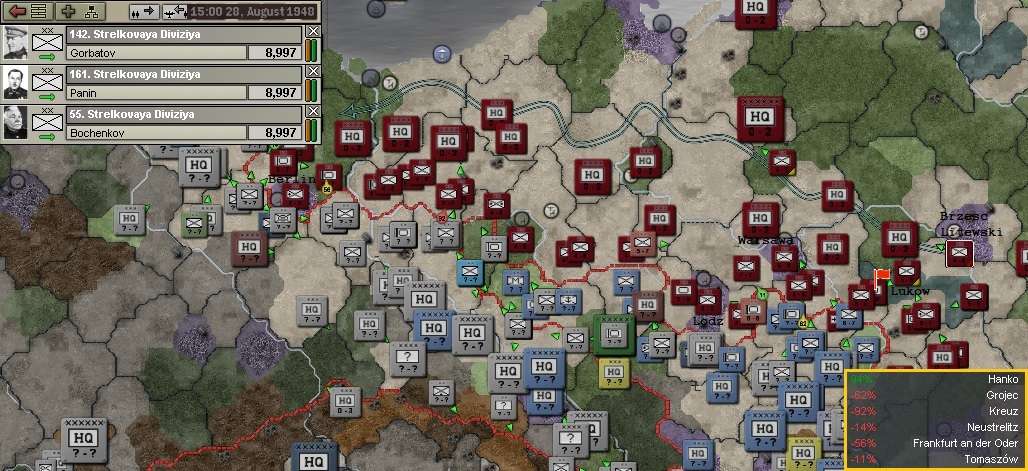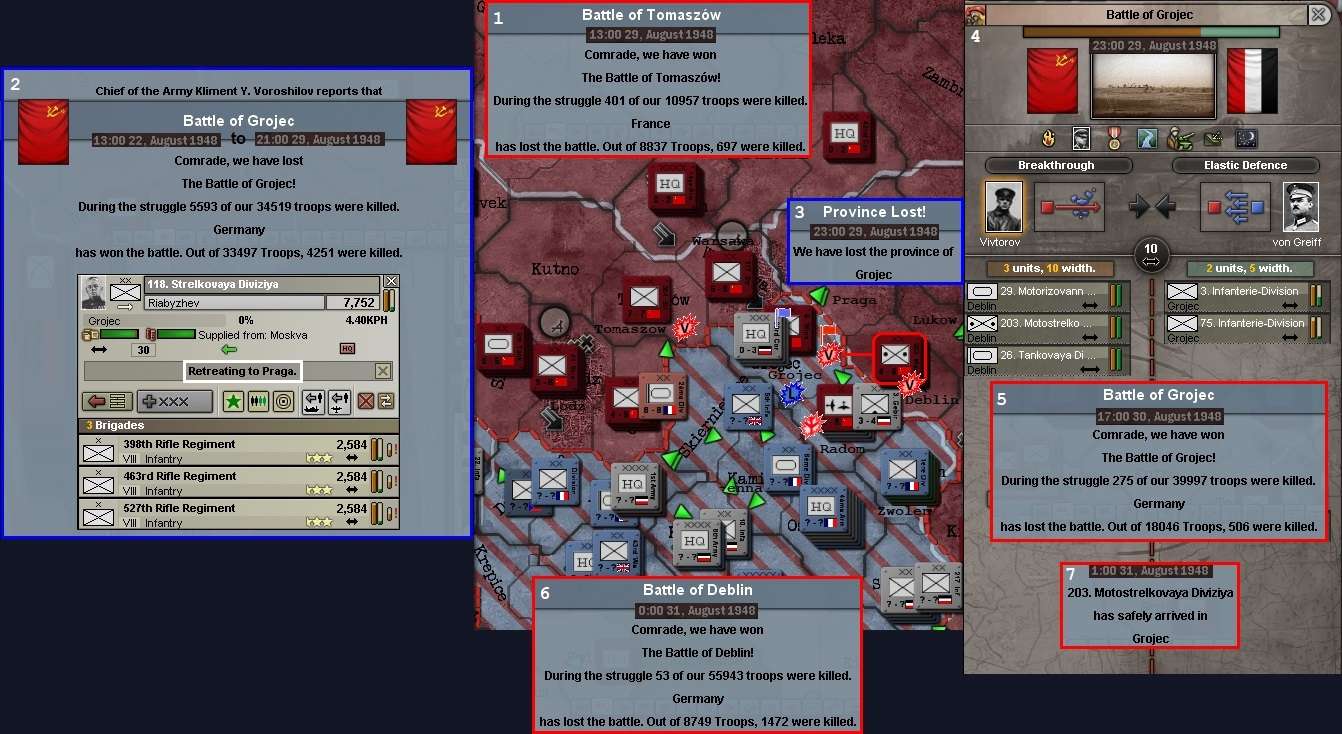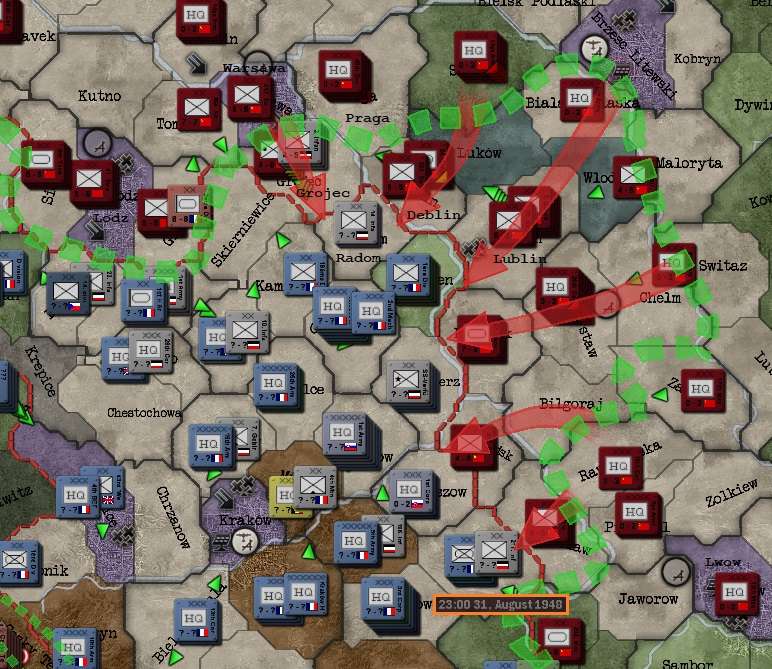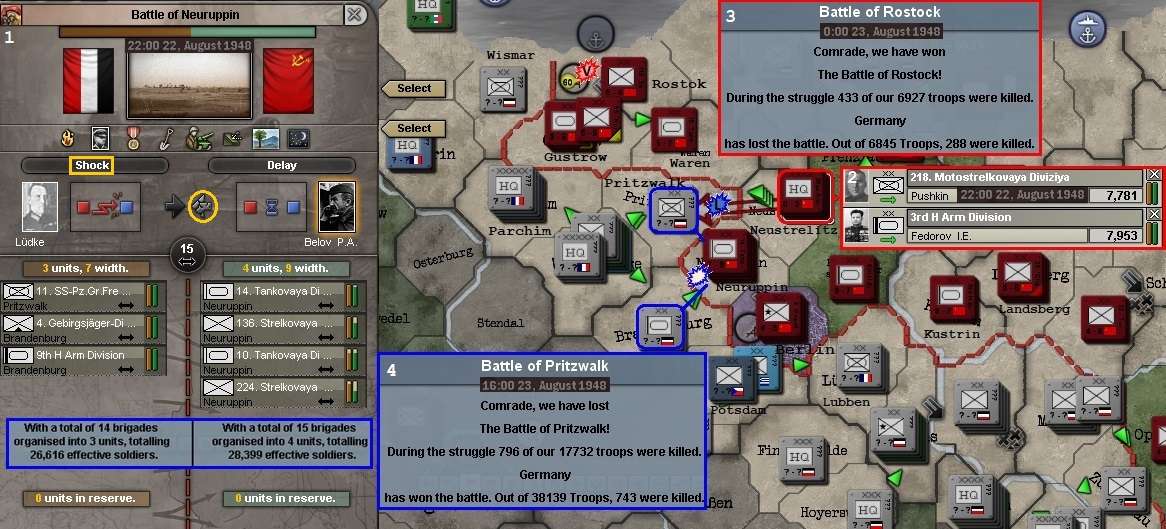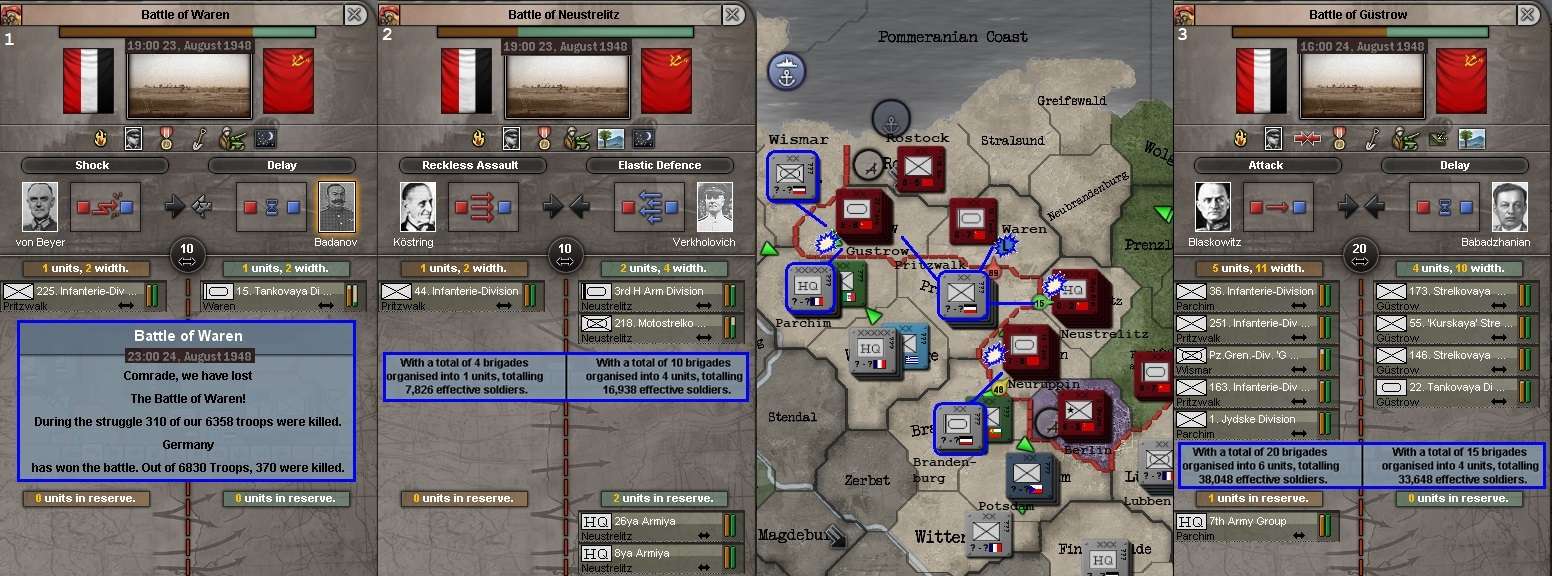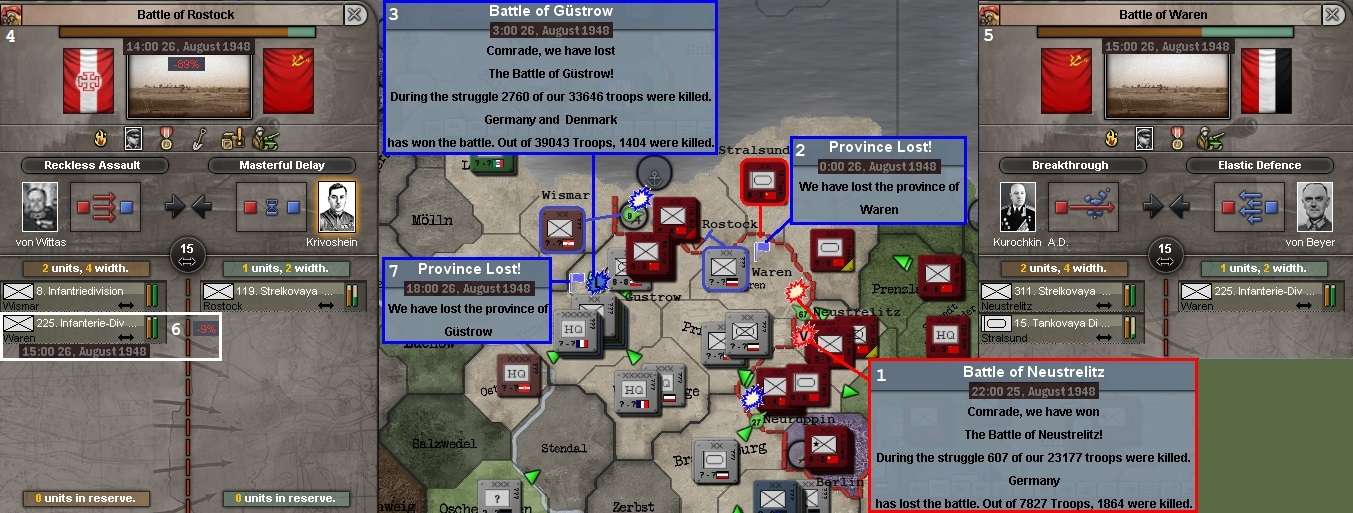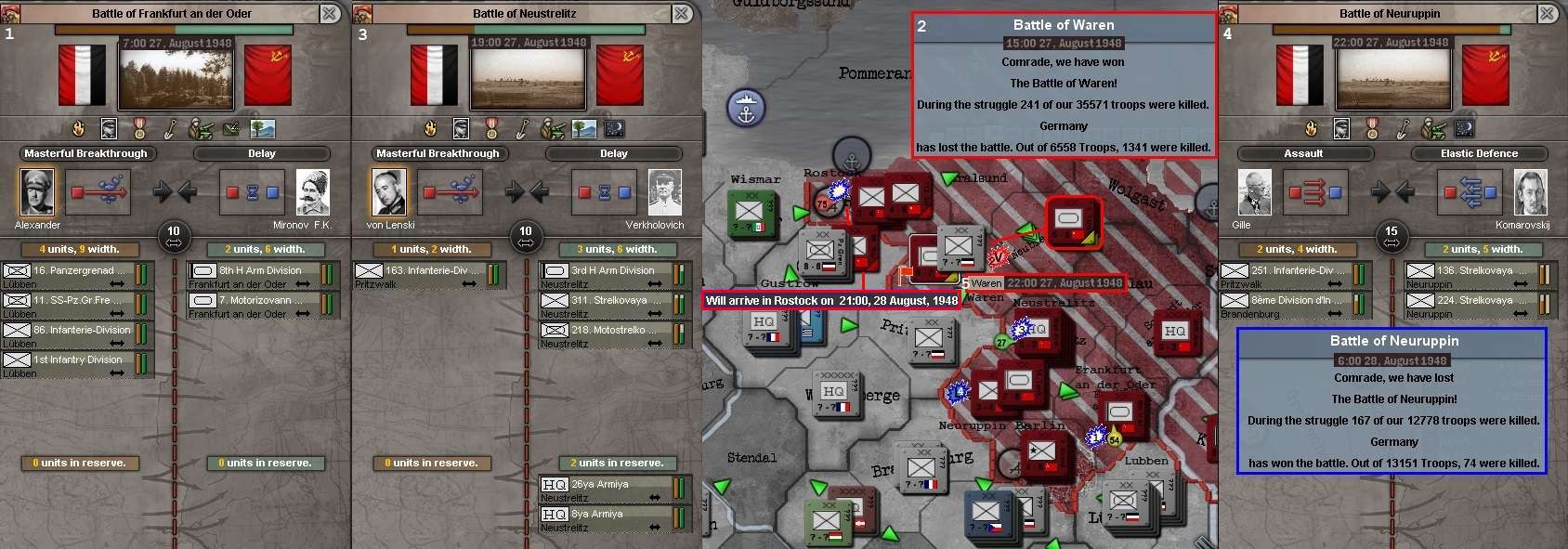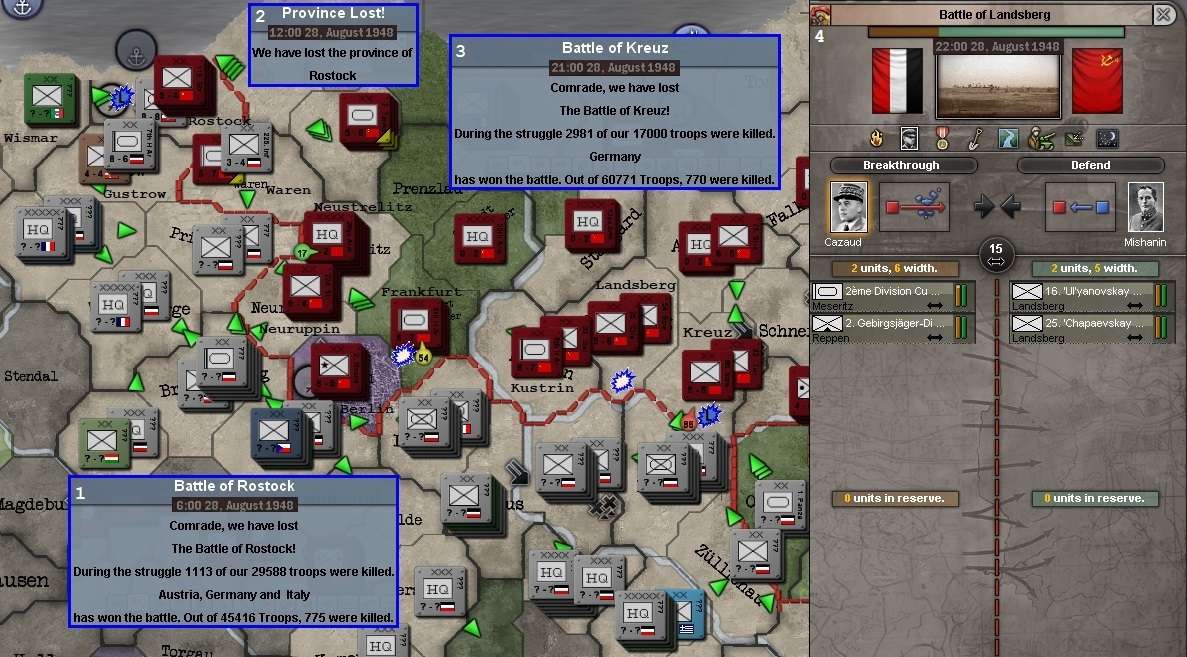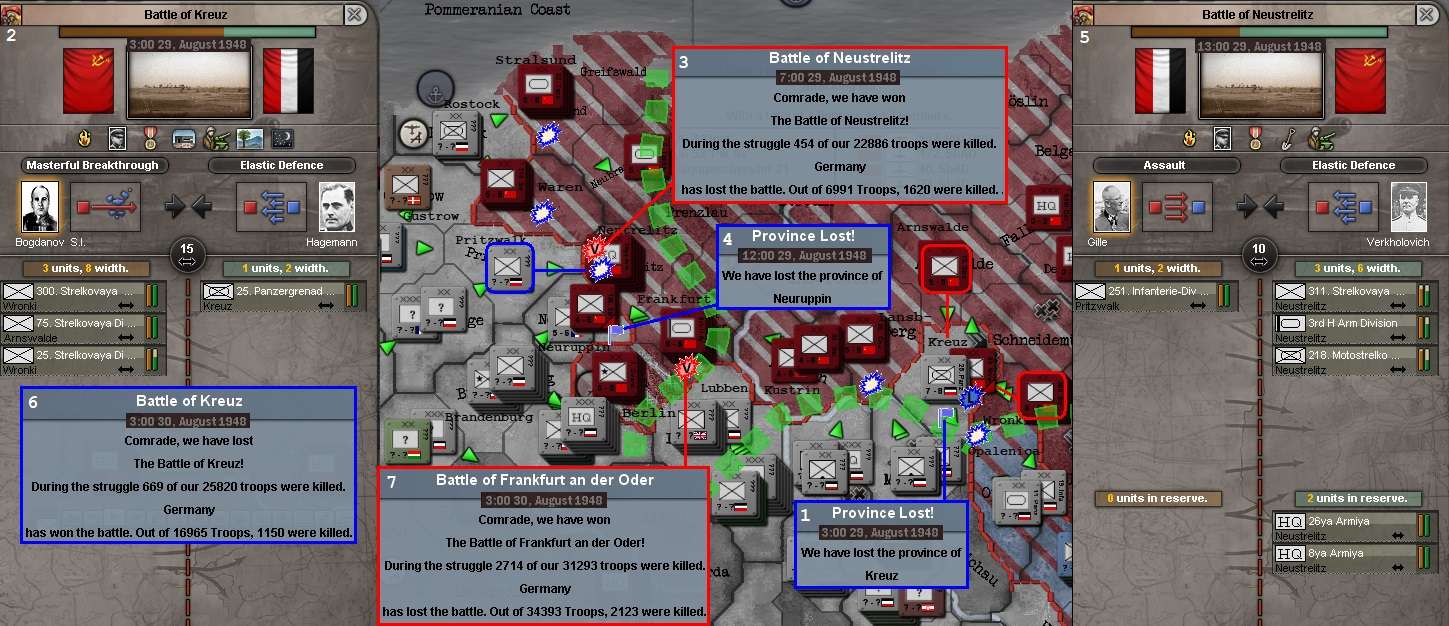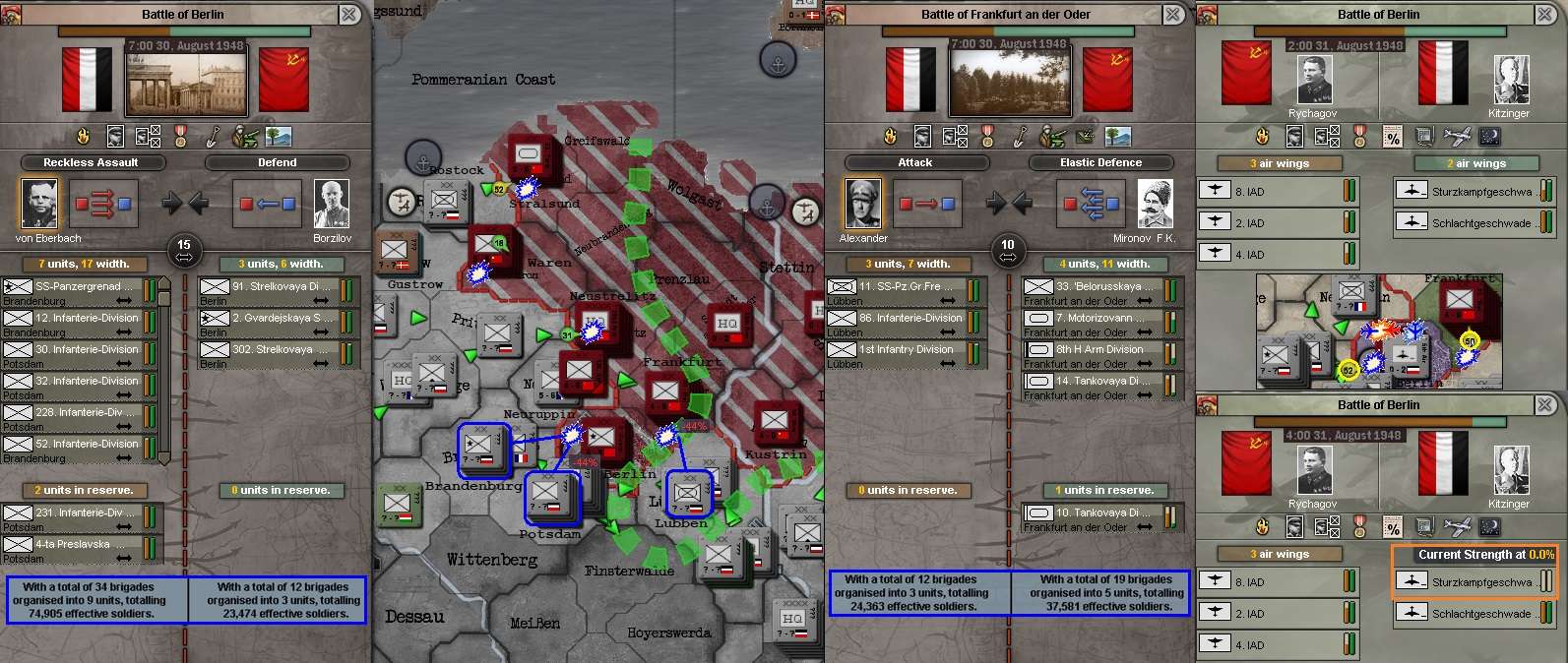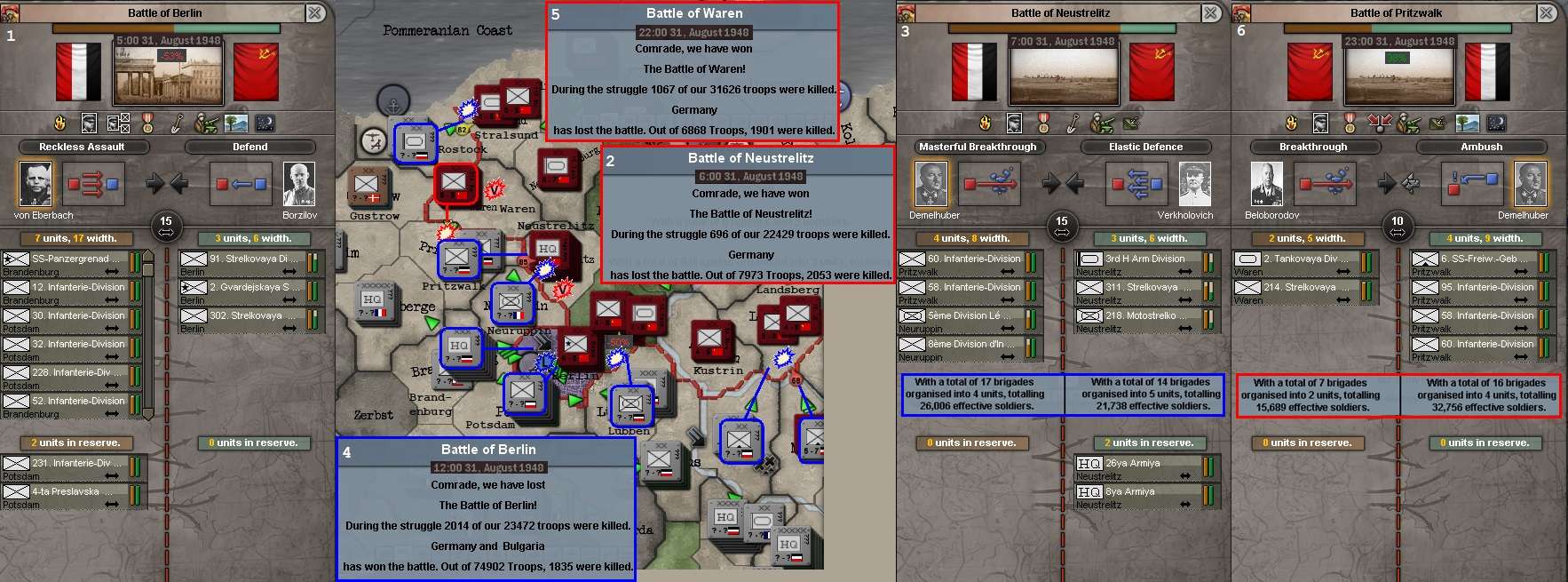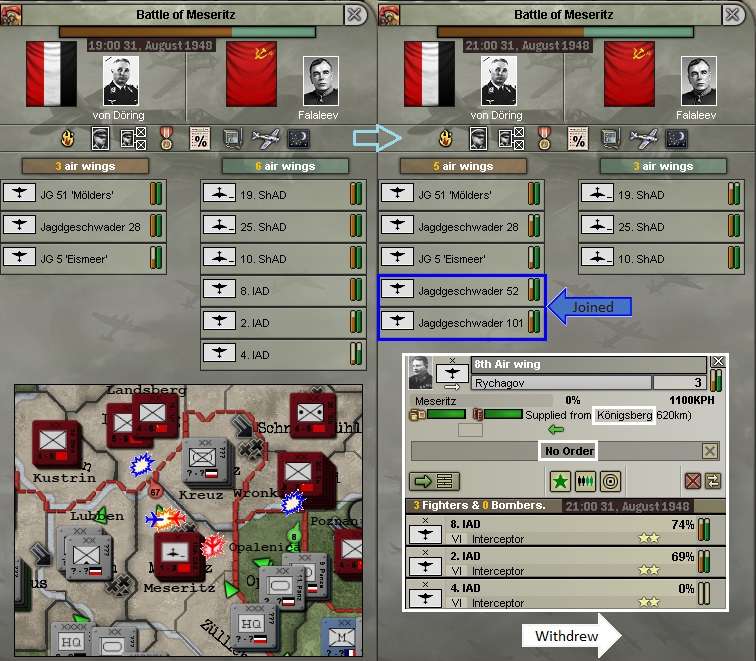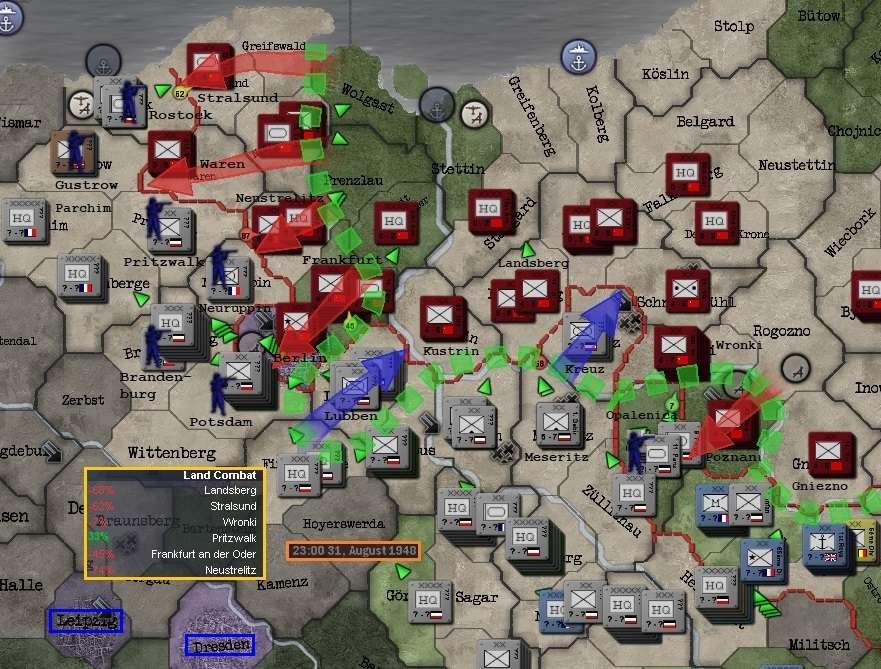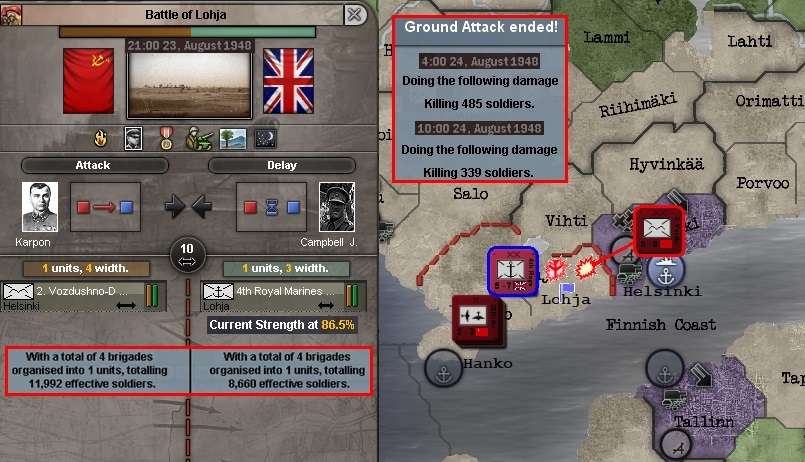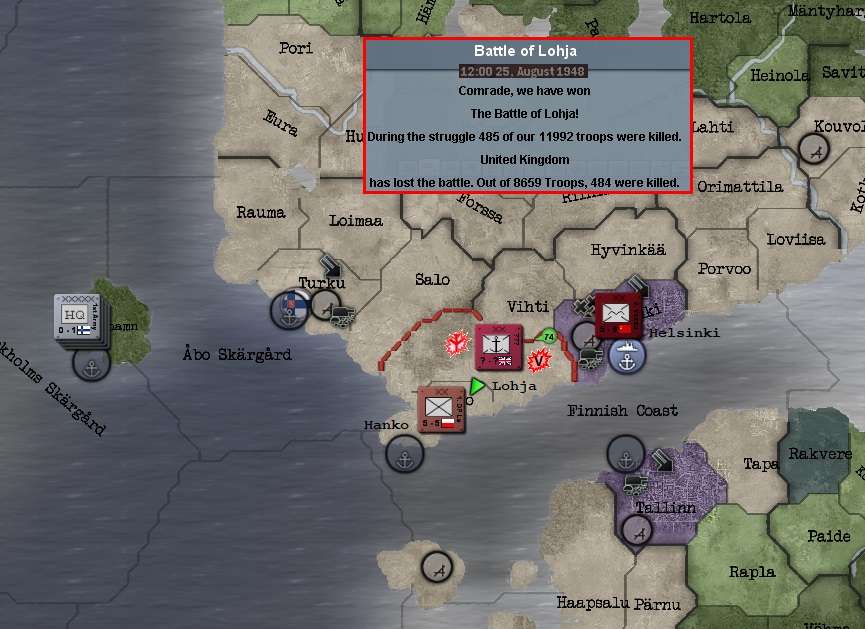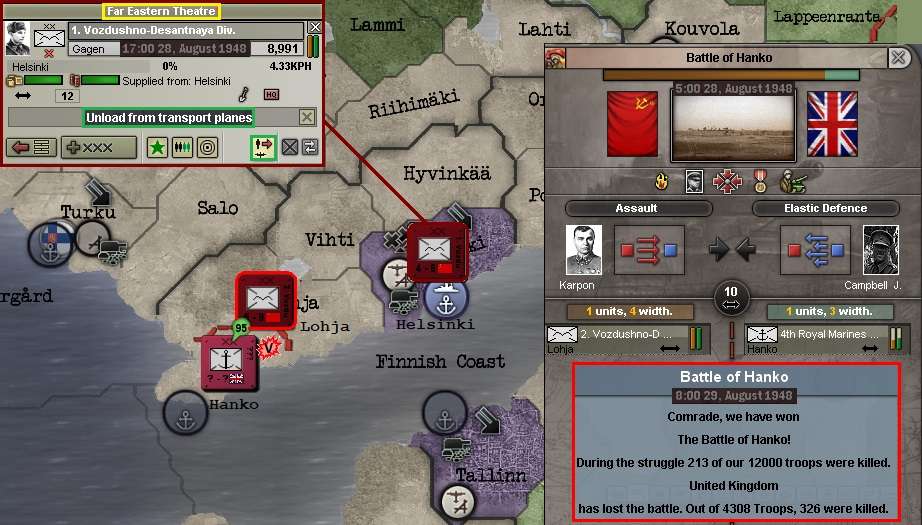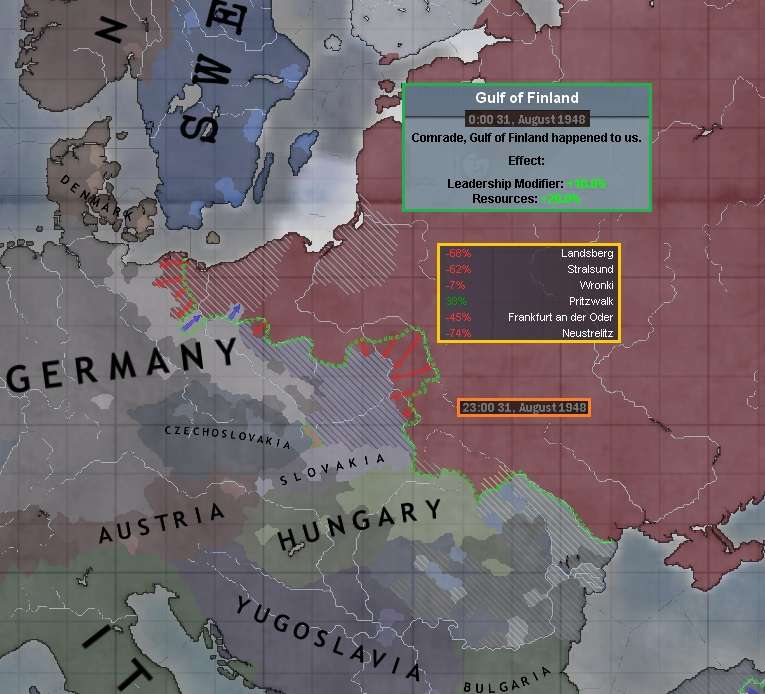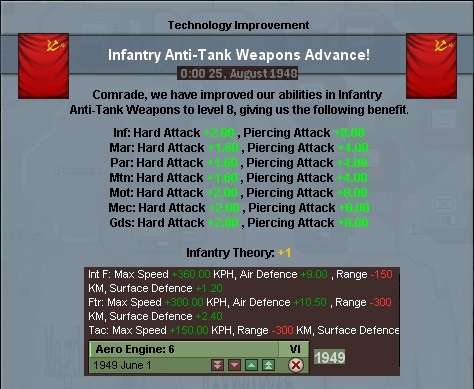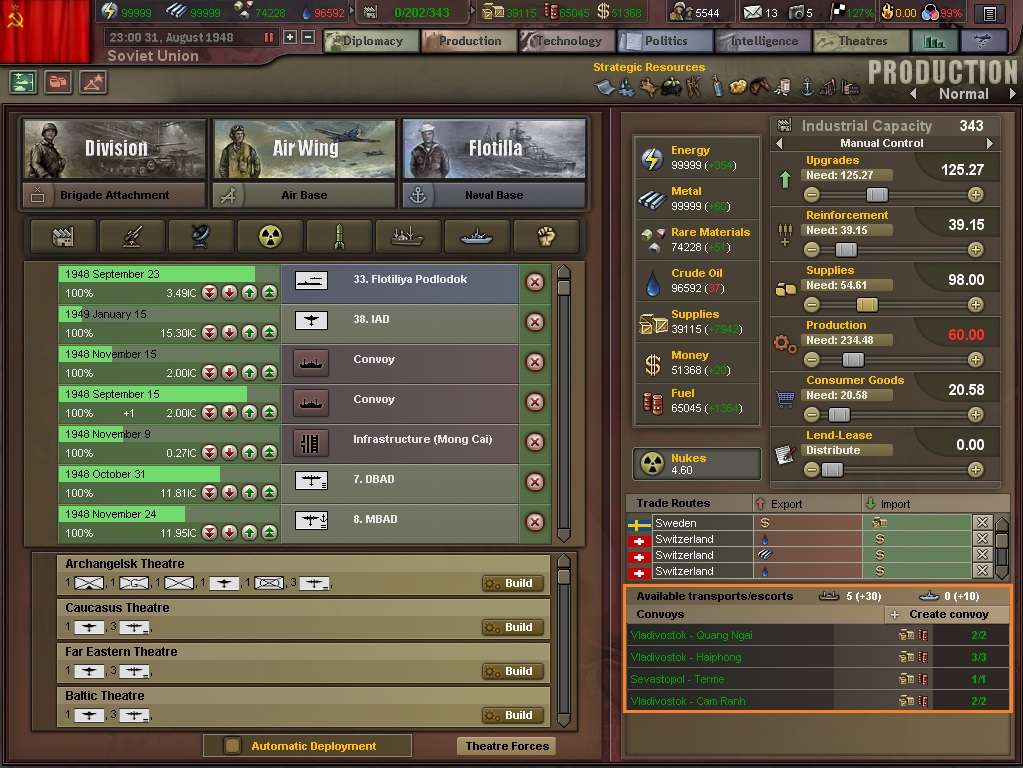Chapter 50: 22-31 August 1948
Note: This is the third and final chapter covering August (the month was all played through in one session). As mentioned above, my thoughts and solidarity are with the people of Ukraine. And the actions of a cold-blooded latter-day despot are not going to derail this AAR, I have decided.
******
1. Vietnam
A new supply convoy of two transports was authorised to run supplies from Vladivostok to Cam Rahn early on the 23rd. This supplemented those already being shipped to Haiphong and Quang Ngai under the threat of Allied interdiction, leaving five transports in reserve. It was hoped this would allow the drive into southern Vietnam to retain momentum.
The VVS began a heavy bombing campaign (the 4th CAS Group joining the 15th TAC Group) of Saigon which caused very heavy casualties for the US Marine division that was acting under Indo-Chinese command as its garrison. Almost 3,900 men were killed between 0700hr on 23 August and 1300 hr on the 24th.
Raids on the Indo-Chinese capital were resumed on 26 August (725 casualties) as Soviet ground troops made their way along the coast to Saigon. This effort was then switched to Phnom Sre Prang in Cambodia, where a new concentration of Allied troops had been spotted. But this time, the VVS flyers found themselves in range of British interceptors.
More VVS fighters were called in for support, but the bombers had taken some substantial damage.
Despite even more Soviet fighters being brought in, the next raid saw 5 BAD almost destroyed, with the likely enemy staging base being in Thailand at Phet Buri. The bombers were called off mid-raid that night, but the interceptors stayed on to degrade the RAF fighters, which they had done quite successfully by midnight.
The Red Army had closed on Saigon by the morning of 29 August and attacked, finding virtually no resistance due to the previous bombing (the US 24th Marines reduced to just 525 men). However, British carrier aircraft did conduct a minor ground attack on 324 SD in Phan Thiet – though two VVS fighter wings were soon mobilised to deal with them.
As August finished, great strides had been made in the offensive against North (French colonial) and South (independent Indo-China) Vietnam. The Soviets were advancing on but had not yet occupied Saigon. One Thai division was spotted advancing towards Hanoi.
2. The Middle East and Central Asia
This front remained mainly quiet during the last part of August as the Soviets stayed on the defensive. An ill-advised Egyptian probe across the Suez Canal on Bîr Gifgafa on 30 August was quickly abandoned.
No combat actions were recorded in Central Asia during this period.
******
3. Turkey
The Soviet supply situation in Turkey had been largely rectified by the start of 23 August as the recent flow of reinforcements from the north bolstered the previously shaky front lines.
A large shock attack on Tokat launched on the evening of 25 August found the Bulgarian defenders badly disorganised and unable to put up a real fight. The province had been retaken by the afternoon of the 27th.
Meanwhile, the aerial preparation of Kaynar to its south-west was met with Adolf Galland’s three Luftwaffe fighter wings on the morning of the 26th. But the well-escorted VVS bombers saw their mission through, while the German fighters were badly mauled.
The bombing of Kaynar continued through to 30 August, when a new six-division Soviet assault was begun to retake it. By that time, the German and French defenders had been very badly damaged and they were only able to resist for seven hours before they were forcibly ejected.
As the month ended, some of the initial Allied gains in central Turkey from earlier in the month had been rolled back a little, while more territory behind the lines had been reclaimed from the nominal French occupation that had followed the Turkish capitulation.
Turkey, the Middle East and Central Asia summary, August 1948.
The Suez line had been re-established and very little had changed in Central Asia, with the Allies taking just one province in eastern Iran earlier in the month.
******
4. Poland
The reporting period began with the VVS intercepting an attack by two unescorted French CAS wings on Opalenica (north-west Poland), the Red Army defenders remained under a heavy Allied attack
[-41% progress].
But in the pocket to the west of Brzesc Litewski, the vice was being tightened. Victory in Wlodawa on the evening of the 23rd saw the surviving 30,000 Allied troops retreating to Luków, which remained under Soviet air bombardment.
To the west of that, a heavy Allied attack on Grojec was making dangerous progress.
24 August saw more heavy fighting, in the air and on the ground, in northern Poland. The day began with the Luftwaffe reaching further east than they had in recent times to intercept three unescorted CAS wings over Luków. Four hours later, the VVS was responding to the same German fighter group over Wlodawa, but this time with heavy Soviet fighter support.
By 0700hr, an attack on the three Allied divisions occupying Luków began – as expected, they were badly lacking in supplies by this time. As that battle continued, a Hungarian fighter sortie was intercepted over Kamiena at 1400hr, with one of the enemy wings reportedly destroyed. The arrival of Soviet reinforcements in Grojec had improved the odds of the defenders, though it was still a difficult fight
[-60%].
At 1900hr on the 24th, the Soviets prevailed in their great battle to take Opalenica. But when two worn out Soviet divisions occupied it three hours later, a fresh force of over 77,000 Allied troops launched a massive counter-attack which the defenders immediately withdrew from. The Allies would retake the province on the evening of the 25th.
But in the pocket, the Allied defence of Luków failed at midday on 25 August: no battle report was received, but around 19,000 Allied troops were captured. An hour later, the Allies gave up on an expensive new attack they had been making on Deblin to once more try to break through to their beleaguered comrades.
The Soviets advanced to try to occupy the province before the Allies retreating from Wlodawa could reach it to renew the defence. But by that night some of the Soviet divisions in Biala Podlaska were already boarding trains to Germany, where the extra troops were badly needed.
But the Allied troops retreating into Luków would arrive in three different groups from 0100hr on 27 August to 0800hr on the 28th. The first battle was a ‘no contest’, with 7,580 survivors of the German 29. PzGren and 1st (Mot) British Indian Division surrendering at 0100hr on the 27th.
Soon after, a rash Italian attack on Jaroslaw began, ending only at 1700hr that evening with over a thousand Italian mountain troops killed.
As that attack ended, another division – German mountain troops – arrived in Luków, only for the 6,550 troops to surrender when attacked by around 44,000 Soviet soldiers converging from multiple directions.
The process was repeated once more at 0800hr on the 28th, with two German and one French infantry divisions with only 8,936 men left between them arriving and surrendering in Luków when challenged by the Red Army advance guard.
It was all over by 1500hr that afternoon, with Luków occupied and the pocket conclusively eliminated. More units were soon on their way to the German front, where the Soviets were under heavy pressure from the building Allied counter-offensive.
The last few days of the month saw continuing heavy combat in northern Poland following the liquidation of the Allied pocket – and it was not all one-sided. A defensive victory was won at Tomaszów, west of Warsaw, on the afternoon of 29 August. But this was followed by a heavy defeat in the week-long battle for Grojec: despite the repeated introduction of reinforcements, the defenders had been unable to hold, the last division withdrawing that night after which the Allies quickly occupied it.
But the Soviets were not done, themselves launching an immediate counter-attack with three fresh divisions. They would ultimately prove victorious by the evening of the 30th and 203. MSD would retake the disputed province very early on the 31st. Meanwhile, another attack on Deblin was beaten back with heavy Allied casualties, plus help from the VVS bombing the attackers in Radom.
Separately, further to the west the Soviets found victory in their defence of Poznan (Soviets 174/38,336; Germany 1,532/8,998 killed) at 1800hr on 29 August.
The month had witnessed the creation and liquidation of the Allied pocket in the marches west of Brzesc Litewski and the ebb and flow of fighting over Grojec ending in Soviet occupation. This had eliminated many Allied divisions and shortened the line in the North-East Polish sector, allowing some troops to begin shifting west to Germany.
5. Germany
In Germany, the Allied German-led counter-offensive remained in progress. A new shock attack on Neuruppin by German forces had begun late on 22 August against four partly-disorganised Soviet defenders. This prompted a quick spoiling attack on Pritzwalk by two Soviet divisions, but that was later called off at 1600hr on the 23rd. In the meantime, the Soviets won a battle to defend Rostock, but only after suffering heavier casualties than their Allied opponents.
The heavy fighting ground on over 23-24 August, with two more Allied attacks launched on Waren and Neustrelitz at 1900hr on the 23rd. The first saw the Allies triumph by 2300hr the next day.
Next, the Allies followed up with an attack on Güstrow on the afternoon of the 24th in an effort to further isolate Rostock, while the battle for Neustrelitz would also continue into the 25th, as would the defence of Neuruppin.
The short-lived and ill-fated attempt by the NKVD to infiltrate Germany and undermine its national unity was formally ended at midnight on 24 August when the last spy team there was eliminated.
The Allied onslaught continued over 25-26 August, though Neustrelitz was successfully held by the Soviets at 2200hr on the 25th. But Waren was lost again to the Allies at midnight and the defence of Güstrow abandoned three hours later after they became increasingly isolated and casualties mounted.
Next came a new attack on Rostock on the afternoon of the 26th, where there were concerns the troops retreating from Güstrow could be cut off if they did not make it back in time. A Soviet spoiling attack on Waren that afternoon caused the German 255. Infanterie to pull out of the Rostock attack straight away, but concerns for Rostock remained, with Güstrow falling back under German control at 1800hr. The battles for Neuruppin and Rostock continued.
Next came a huge all-German attack further east on Kreuz early on the 27th by seven fresh and full-strength divisions numbering almost 61,000 troops, against two dug-in Soviet infantry divisions with 17,000 men occupying the local fortifications. They were well-positioned
[-48% progress], but most of the attackers were armoured formations and the 3-1 numerical disadvantage could prove too much.
A powerful new German attack on Frankfurt an der Oder followed that morning, threatening to cut off Berlin to the east. To counter this news, the latest battle for Waren was won by the Soviets at 1500hr and it was retaken yet again by 2200hr that night.
The defence of Neustrelitz continued, but by 1900hr the remaining German attackers were weakening. Another probe on Neuruppin was beaten back by 0600hr on 28 August. The Soviet division retreating from Güstrow was due to arrive in Rostock at 2100hr on the 28th, but in a worrying sign the defence of Rostock had taken a turn for the worse.
Indeed, the battle for Rostock was lost at 0600hr on 28 August and fast-moving German panzer-grenadiers would retake it by midday: the Soviet troops en route from Güstrow had no choice but to surrender.
To the west, the fight to defend the Vistula crossing at Kreuz was lost at 2100hr with heavy casualties. Soon after, the Allies were attempting to widen their bridgehead with an attack on Landsberg. The Allies were slowly gaining ground in their attack on Frankfurt an der Oder though Neustrelitz held strong, as the attack there continued.
The loss of Rostock meant German surrender progress was back to just 51%.
There was no let-up in fighting on 29 August, with the first event being the Allied reoccupation of Kreuz early that morning, with an immediate Soviet counter-attack launched against the sole German division that had arrived at that point. The attack would be called off a day later after the arrival of another Allied division. Later that morning, the Allies finally abandoned their attack on Neustrelitz – only to launch a fresh attack an hour later.
Worse news followed, with Neuruppin lost to the Allies at midday after the defenders there had been ejected. This further isolated Berlin, whose only remaining lifeline was through Frankfurt. Fortunately, the Soviets won a hard-fought victory there at 0300hr on the 30th. The Allies were now also attacking Stralsund and Waren in the north.
The next phase of the Allied plan began at 0700hr on 30 August, with a heavy attack on Berlin by almost 75,000 mainly German troops, opposed by around 23,500 Soviet defenders. This was accompanied by a simultaneous renewed holding attack on Frankfurt, where some of the defending divisions remained badly disorganised.
The Battle for Berlin continued into 31 August, with the Luftwaffe sending in unescorted CAS wings to assist. One of them was virtually wiped out by the VVS, but on the ground the odds were beginning to run in favour of the Allies, while the Soviets clung on grimly in Frankfurt.
By 0500hr on the 31st, the reckless German attack on Berlin showed no sign of flagging. Another Soviet victory in Neustrelitz at 0600hr was once again followed up just an hour later by a renewed Franco-German attempt to break through. This time, with the defenders already weakened, the odds were grim. With the grim defence of Berlin beginning to fail and Frankfurt still at risk, at midday the fateful decision was taken to abandon Berlin, the three divisions there falling back rather than risk being cut off and destroyed.
One piece of brighter news was the defeat of the Germans attacking Waren, though a single German division had inflicted heavy casualties on a force more than four times their number. This was followed up with a spoiling attack from Waren on Pritzwalk, to see if the desperate defence of Neustrelitz could be aided, as the odds there turned for the worse. To the west, by the end of the day a strong Allied attack on Landsberg to gain another bridgehead over the Vistula was making progress.
The action on the ground was accompanied by several aerial battles, the most significant of which occurred over Meseritz on the evening of 31 August. The VVS was trying to impede the attack on Landsberg with a CAS ground attack, which the Luftwaffe had contested. Two more German wings were thrown into the battle at 2100hr, forcing the interceptors to immediately withdraw when 4. IAD was almost destroyed.
As August ended, many of the Soviet gains made in Germany earlier in August had been rolled back; Berlin was still nominally controlled by Stalin, but a large Allied force would soon be back in possession of its ruined former capital. The Allies were on the attack in five provinces stretching from Wronki in the east up to Stralsund in the north-west of the line. The only Soviet attack was a spoiler on Pritzwalk. And the Allies now had a bridgehead over the Vistula at Kreuz. The additional units from northern Poland were still some way off, while any reinforcements from the Far East were weeks away.
Germany and north-west Poland, 31 August 1948. The blue soldier icons show territory that had been held by the Soviets for part of August but then been retaken by the Allies in their counter-offensive.
******
6. Finland
The small British marine raid in southern Finland had initially taken the port of Hanko unopposed, with the 4th Royal Marines then marching east towards Helsinki, while the recently airlifted paratroopers of 2. Vozd. Div set out west from Helsinki to intercept them: both were headed for the coastal province of Lohja, which sat between the two bases.
The VVS soon began striking the British as they made their way east, the first ground attack on Hanko caused 471 casualties at 0600hr on 23 August. A simultaneous port strike by 3rd Strat Group out of Stettin had basically disabled the facilities in Hanko by 1100hr, hopefully drastically disrupting enemy supply lines.
Another ground attack finishing at 1500hr killed another 311 British marines in Hanko. By 2100hr, the British had arrived first in Lohja, coming under immediate attack by 2. Vozd. Div. They had already been reduced to 85% strength by air attacks even as the battle began. The British remained under heavy VVS attack, with another 824 enemy killed that morning.
The Soviet air and ground assault would keep up for the next day, until the marines broke at midday on 25 August, fleeing back towards their start point in Hanko after a tough battle which had seen ground casualties (at least) evenly distributed.
The relentless air attack on the 4th Marines had continued on their harrowing retreat to Hanko. By the morning of 28 August, 2. Vozd. Div had caught up with them and began their assault on Hanko. That evening, the three-brigade 1 Vozd. Div had been airlifted into Helsinki after having been picked up and flown over from the Far East.
As the Soviets attacked, only 4,300 of the British marines were left: just under 4,000 of them would survive the 27-hour battle to be taken prisoner on the morning of 29 August. The short Finnish campaign was over.
Overall, in the West August had seen a major Soviet victory in front of Brzesc Litewski, but some of the initial gains in Germany and north-western Poland rolled back by the end of the month, with the Allies remaining firmly on the offensive there, led predominantly by the ‘returned’ German Army. The regaining of Hanko had at least restored Soviet control over the Gulf of Finland, with benefits for research and resource production.
It remained to be seen whether the short-term transfer of divisions from the liquidated Polish pocket could blunt Allied momentum in Germany. In the longer term, it was unclear whether the later arrival of significant numbers of experienced excess troops repatriated from the Far East would be enough to counteract Allied numbers and industrial superiority in Europe.
******
7. Research and Production
Just the one research advance was made during the reporting period, which would be useful for the majority of Soviet units but would require a significant IC allocation to support the anti-tank weapon upgrades throughout the Red Army. The next priority would be to improve aero engines to improve the speed of all VVS planes.
By the end of August, the majority of the USSR’s IC was sunk in upgrades, then supply, production followed by reinforcement costs. With resource stockpiles all healthy enough and Allied control of the seas, convoy routes had been strictly limited to vital supply lines only, mainly supporting the Vietnam campaign. There were still five spare transports and thirty more in production, plus ten escorts.



